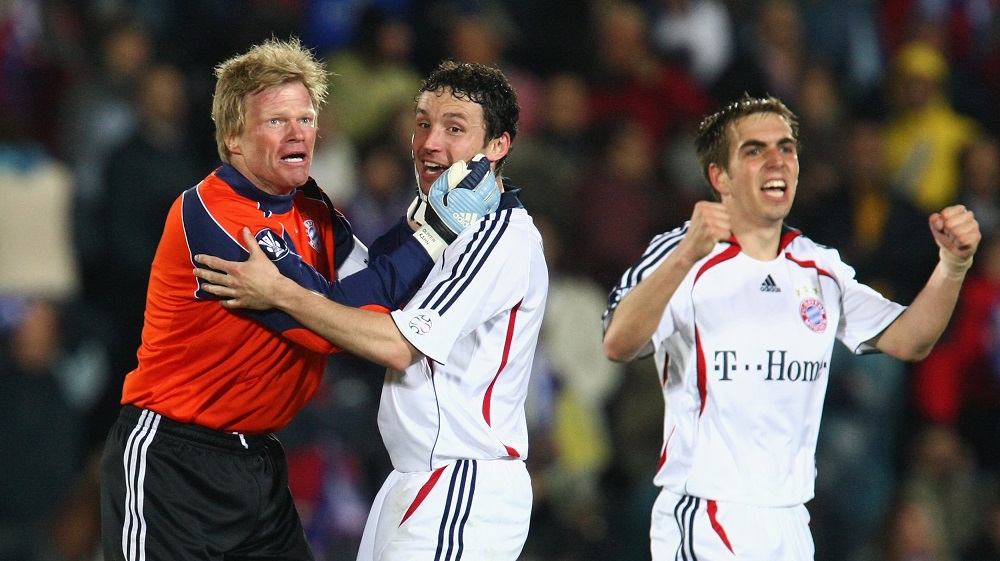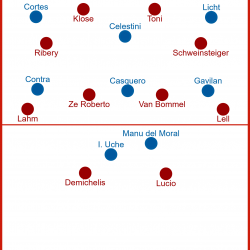Game of my Life #10: Even Oliver Kahn had never seen anything like this
The situation before the match
The 2006/07 season had been the worst season for Bayern since the middle of the 1990s. After double winning coach Felix Magath had already lost his job mid-season, the club invested the then record amount of €93.2m to revamp the squad in the summer.
Ottmar Hitzfeld, who had followed Magath for his second stint as Bayern coach, was given a completely new offense with World Champions Luca Toni, German international Miroslav Klose, and the highly talented but difficult Franck Ribéry. Moreover, Zé Roberto returned after one year away from the club. On the other hand, with Roque Santa Cruz, Roy Makaay, Claudio Pizarro and Hasan Salihamidžić some long-serving stalwarts left the club.
The thus renovated team dominated the early stages of the new season. A special highlight was the 4-0 win against staunch rivals Werder Bremen on matchday two, where the duo of Toni and Ribéry was able to shine for the first time. Ribéry especially displayed a level of technical skill, pace, and joy of playing that had been virtually unknown in the Bundesliga up to that point. The first loss in the league came on matchday 13 against Stuttgart. However, because Bayern had also p six draws, they were level on points with Bremen at the winter break.
Until the match against Getafe, Bayern lost only one more match – against Cottbus – and was able to pull away from second placed Schalke by nine points thanks to a temporary lull in form of Bremen. Bayern’s consistent run of results was due largely to a very stable defense built around Martin Demichelis, which had only conceded 16 goals so far. Just another five additional conceded goals until the end of the season meant a new Bundesliga record.
Because of Bayern’s disappointing previous season, they had to make do with a place in the UEFA Cup. And so a series of trips to some of Europe’s more unknown regions began. After Bayern beat Belenenses SAD in the pre-group-stage match, they stumbled their way through the group stage, only securing their progress with a 6-0 home win against Aris Football Club. The next two fixtures were against Aberdeen FC and RSC Anderlecht, and then Getafe CF – of Madrid suburb Getafe – waited in the quarter-finals. The first leg saw the Spaniards travel to Munich before Bayern had to make the trip to Getafe for the return leg. Getafe CF was only known to experts at the time and when Luca Toni scored the opening goal in the 26st minute of the first leg, the tie already seemed more than halfway won for Bayern. But in the following, Getafe proved a much harder challenge than expected and managed to score a lucky punch in the 90th minute while preventing Bayern from scoring a second. After some hustle and bustle in Bayern’s penalty area, substitute Cosmin Contra was able to dink the ball over the slightly puzzled Oliver Kahn into the back of the net for the equalizer. And so Bayern had to make the trip to Spain with an unfortunate 1-1 draw in their bags instead of a tie done and dusted.
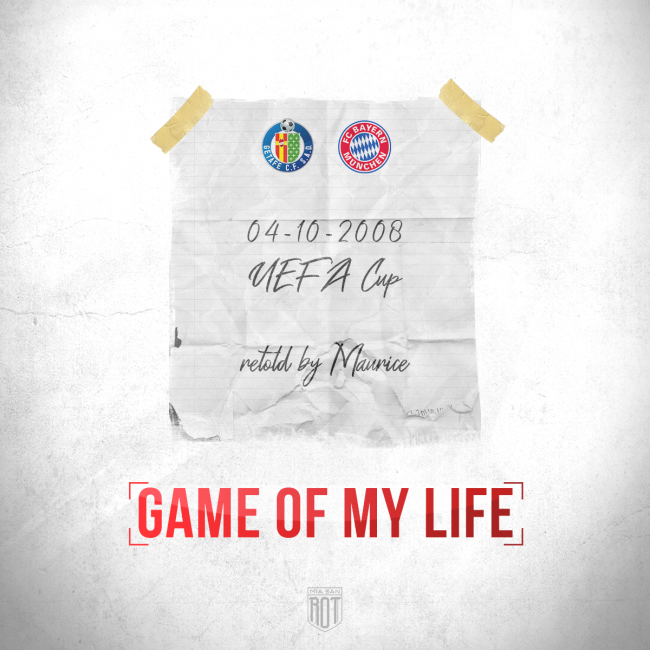
In case you missed it
The starting lineups
Coach Ottmar Hitzfeld did not want to jeopardize his prospects of advancing to the next round and started his best eleven. The back line consisted of Bayern youth players Lahm at left-back and Lell at right-back, as well as Lucío and Demíchelis in the center. Van Bommel and Zé Roberto were the double pivot in defensive midfield with Ribéry and Schweinsteiger providing the width. In attack, Klose for Podolski was the only personnel change Hitzfeld Made from the first leg. Luca Toni started alongside him. He had already scored eight times in the UEFA Cup.
Getafe coach Michael Laudrup – brother of former Bayern player Brian – unexpectedly made five changes from the first match. Most notably, first-leg goal scorer Contra got a start and in goal Abbondanzieri came in, whose nickname was “the duck”, which will be discussed later. Midfielder Ruben de la Red moved into central defense to make room for Contra in Getafe’s 4-4-2 diamond formation.
The first half
All of Laudrup’s pre-match ideas, however, quickly went overboard when he was forced to reshuffle his lineup after just six minutes when de la Red was sent off with a red card. It was a tough decision against the Spaniard, who had clearly fouled Klose on the edge of the penalty area, but was also accompanied by his teammate Cortés.
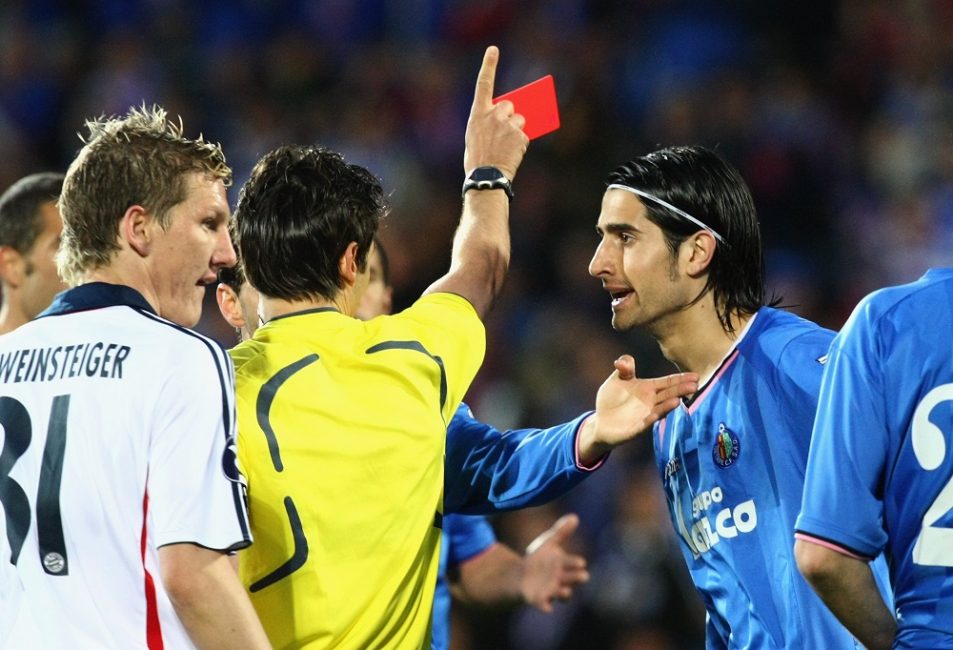
(Image: Alexander Hassenstein/Bongarts/Getty Images)
Irrespective of the sending-off, the game in front of just 17,000 spectators was an energetic contest right from the off. As soon as the first minute, Toni prevented Ribéry from scoring. After eight minutes, Ribéry again only hit the post with a free kick. Toni scored from the rebound, but the goal was disallowed because Klose had previously stopped the ball with his hand. After Getafe had to replace the injured Uche, Bayern were increasingly dominant, but not clinical enough in front of goal.
And so the inevitable happened. Once again it was Contra who struck Bayern at the heart. One minute before the break, he started a run towards Bayern’s goal from deep in his own half, got past Demichelis and van Bommel and hit the ball with full force right under the crossbar, making it 1-0. As it stood, Bayern was now eliminated being one man up…
The second half
At half time, Ottmar Hitzfeld reacted and brought on Marcell Jansen for Lell. Jansen went to left-back while Lahm switched to right-back. It did not take long in the second half before the ball once again landed in the back of Getafe’s net. Toni had scored, but just as in the first half, the referee called the goal back. The Italian striker had pushed his opponent to the ground and the decision was undisputed.
The remainder of the second half saw Bayern frantically pushing and pressing against an almost unconquerable defensive stronghold by the Spaniard. They had a few chances, but Getafe stood firm and compact and was able to release the pressure and catch their breath with occasional counterattacks. Would the mighty FC Bayern be humiliatingly eliminated halfway into a European competition by a humble side from a Madrid suburb? Would the international career of “Titan” Oliver Kahn end on a note like this?
When Bayern’s fate seemed already sealed, van Bommel played a lovely chip ball – yes, van Bommel, you read that right – into the penalty area, where Toni won an aerial duel and knocked the ball down into Ribéry’s feet, who drop-kicked the ball into the bottom right-hand corner of the goal. Suddenly, Bayern had a lifeline.
Extra time
With one more player on the pitch and the psychic boost of a last minute equalizer in their backs, one might think that extra time would have been a piece of cake for Bayern – but the opposite was true. Just two minutes after kick-off, Casquero leathered a shot on Bayern’s goal from twenty metres out, which bounced against the inside of the post and went in. 2-1. A wonder strike that left Kahn with no chance. But this was not yet the end of the story. Only a little while later, Lució failed to clear a cross-field pass, allowing Getafe striker Braulio to turn and finish in best Gerd Müller Style to make it 3-1. “3-1! This is the end of the road for Bayern,” the match commentator was sure – only to correct himself a second later: “Possibly the end of the road.” Did he known something more?
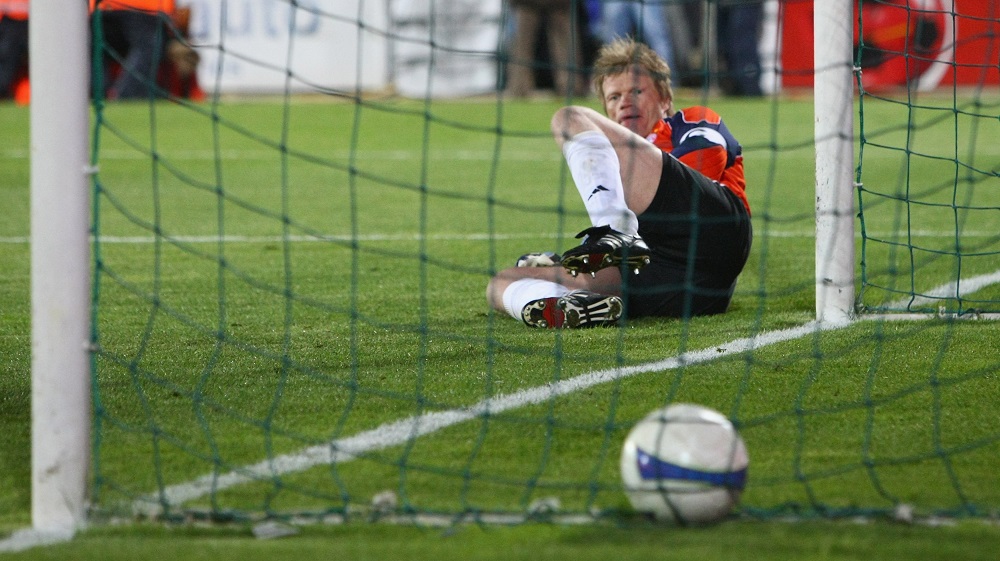
(Image: Alexander Hassenstein/Bongarts/Getty Images)
In the 115th minute, van Bommel hit a long, harmless free kick towards Getafe’s goal. “Duck” Abbondanzieri, of all people, could not hold on to the ball allowing Toni to demonstrate his goal scoring nous. He was right where he needed to be, picked the ball up and scored the goal. 2-3. A gift for the record champions. And now there were five minutes left for scoring yet another goal.
But the minutes passed by without Bayern being able to create another significant chance. Then Kahn took the initiative. He could not bear it anymore. He could not be stopped. He left his goal and ran across the entire pitch to provide an additional body in Getafe’s penalty area. A long ball from the outside actually reached him and although he lost an aerial duel, he managed to put off one of the Spanish defenders enough that he involuntarily put the ball straight at the feet of José Ernesto Sosa. Bayern’s substitute had largely been ineffective up to that point, but now he crossed the ball into the penalty area for one last time. Demichelis missed, but Toni got hold of the ball at the far side of the six-yard area. In a moment that feels like an eternity in memory but took only seconds in reality, the ball bounced up and over Abbondanzieri into the net.
And now the floodgates opened. Toni ran across the pitch with his index finger placed on his lips to silence the crowd, brimming with excitement. But all cameras were trained on Kahn as the Bayern captain, tears of happiness streaming down his face, threw his fists in the face of teammate van Bommel in excitement, breaking his nose in the process. It did not matter on this memorable night.
We are FC Bayern
“Miracles happen when there is passion,” a banner by the supporters read in the South stand before the match. If this team had anything, it was passion and desire to win. It was the last great battle of the original “mentality giant” Oliver Kahn, who had seen it all during his career. Manchester 1999. Bremen 1999. Unterhaching 2000. Schalke 2001. Valencia 2001. Yokohama 2002. But this night will be forever edged on his memory just as much.
For me as a young Bayern supporter this was the first game in which I had consciously witnessed the famous Bayern gene at work. On all the other, previous occasions I mentioned above I was still too young to see the fire in the eyes, to feel the self-assurance in the bearing of the players. But on this Thursday night, I felt the passion, the zeal, the energy oozing from such great players as Kahn, van Bommel, and Toni.
Stefan Effenberg, part of many a memorable moment as a Bayern player himself, also called on the myth of FC Bayern on German Pay TV before the match: “We are FC Bayern.” Yet during the game, it seemed as though this spirit had taken a leave of absence for very long stretches. But after 120 minutes, every spectator in the stadium and in front of their TV knew that this team was FC Bayern after all.
The match will have been a key milestone in the development of Bayern’s young up-and-coming players Ribéry, Schweinsteiger and Lahm. An experience like this fosters a sense of unity and the belief that you can overcome any hurdle if only you try. “Never give up!” is the spirit that Oliver Kahn handed down to the next generation with his emotions and his application in this match.
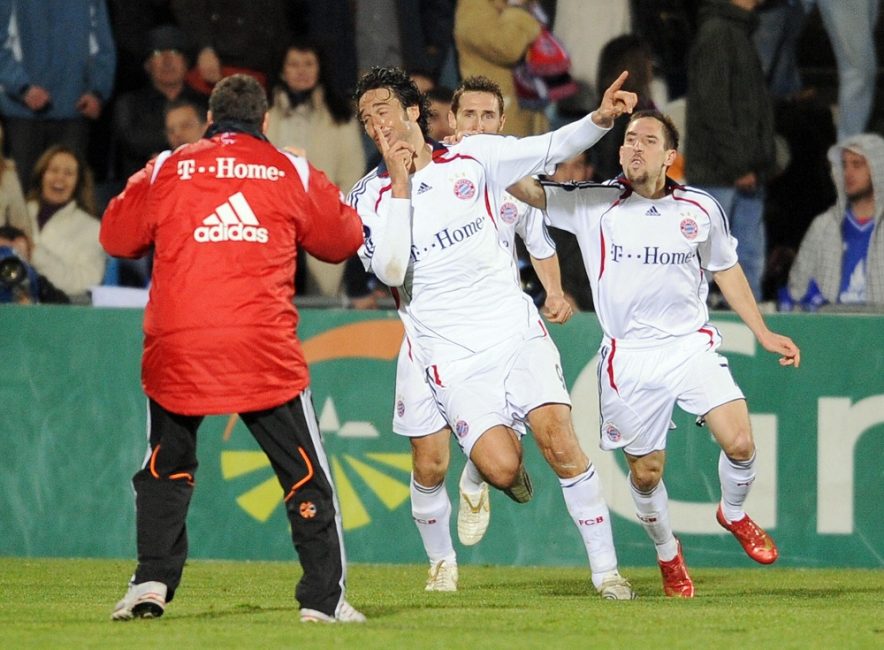
(Image: Javier Soriano/AFP/Getty Images)
The win against Manchester in 2010, the last-minute victory in Wembley 2013 or the title in Rio 2014. All these magical moments owe a tiny part of their existence to this mesmeric night in a small Madrid suburb.
What the game meant
Even though the match was only a UEFA Cup match, it had all the hallmarks of a Champions League encounter. For both the players and the Bayern fans, it was like a soothing balm on their long unfulfilled yearning for a glorious night in the European Cup.
However, Bayern’s title hopes were brutally cut short as the team ignominiously went out against Zenit St. Petersburg in the next round. The first leg in the Allianz Arena ended in a 1-1 draw after a Lució own goal cancelled out Ribéry’s lead. The subsequent 4-0 away defeat was so utterly embarrassing that rumors persisted for a long time that Bayern had accepted a generous bribe to lose.
The team acquitted itself better in the domestic competitions. Bayern won the Bundesliga championship 10 points ahead of Bremen in second place. In the DFB-Pokal final it fell to Luca Toni again to secure the victory with a brace against Dortmund.
On matchday 34, the season had one last emotional highlight in store for Bayern. Ottmar Hitzfeld, brimming with tears of emotion, left the club having led Bayern to five Bundesliga championships and a Champions League title. Equally tearful was the departure of Oliver Kahn, who also ended his mesmerizing career, having collected eight Bundesliga championships, five DFB-Pokal titles, and two European titles.
For the new season, the club took a risk and appointed Jürgen Klinsmann as their new head coach. But what became of the former national coach on Säbener Strasse and whether the risk paid off is another story for another day.



